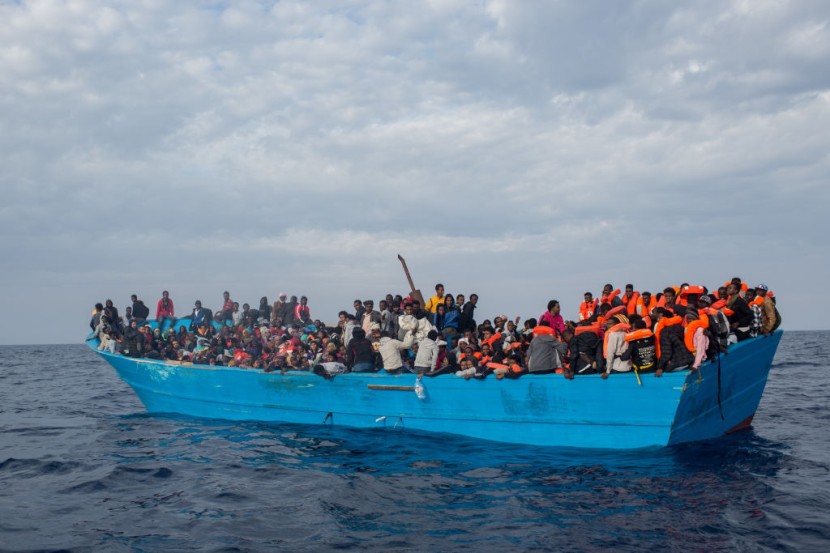
European Union Commission President Ursula von der Leyen and Italian Prime Minister Giorgia Meloni embarked on a tour of a migrant center on the tiny Italian island of Lampedusa, where they confronted the ongoing migrant crisis that has deeply affected the region.
The migrant center on Lampedusa recently faced an overwhelming influx of nearly 7,000 migrants within 24 hours, roughly equivalent to the island's entire population, as per VOA News.
EU Leaders Confront Mounting Migrant Crisis During Lampedusa Visit
Residents of Italy's southernmost island expressed their growing frustration with the constant stream of arrivals on their tiny island, which has struggled for years to manage the ongoing crisis. Lampedusa's strategic location, situated less than 160 kilometers from Tunisia, makes it a logical first stop for migrants seeking a better life in Europe and beyond.
Many undertake the perilous journey in rickety boats, often requiring rescue by the Coast Guard, and tragically, not all survive the treacherous voyage. Among the recent casualties was a 5-month-old baby, a stark reminder of the human cost of these dangerous journeys.
Prime Minister Giorgia Meloni, who assumed office last year, has made ending mass migrations a cornerstone of her leadership. Her visit alongside Ursula von der Leyen aimed to address the pressing challenges faced by Lampedusa.
Television footage captured the politicians engaging with residents during their three-hour visit, which included stops at an overcrowded reception center and a site near the port containing the remains of flimsy boats used by migrants. This visit followed a dramatic surge in arrivals, with nearly 8,500 people landing on the island within three days, surpassing the island's population of 6,000.
The tragic death of a newborn, who passed away shortly after birth on a boat carrying 40 passengers, deeply moved the community. Last week, another heart-wrenching incident occurred when a five-month-old boy drowned during a rescue operation.
Recently, chaotic scenes unfolded at the reception center, designed to accommodate only 400 people. Migrants were left sleeping on the streets strewn with refuse while others attempted to escape over fences.
However, by the time Meloni and Von der Leyen arrived, most migrants had been relocated to Sicily or mainland Italy centers, restoring a sense of order around the center. In recognition of the immense challenges faced by Lampedusa, Meloni's far-right government allocated close to $50 million to support the island in managing the unprecedented influx of migrants.
Despite this financial aid, some residents argue that more is needed to address the magnitude of the crisis. Prime Minister Meloni expressed her concerns, stating that the ongoing influx poses a significant threat to the future of Europe and demands serious solutions.
She emphasized the importance of cracking down on human traffickers, expeditiously deporting illegal immigrants, and swiftly implementing a deal signed earlier this year with Tunisia. Ursula von der Leyen, echoing Meloni's sentiments, pledged to accelerate the deportation process for those not qualifying for asylum and combat the brutal business of people smuggling.
She asserted, "We will decide who comes to the European Union and under what circumstances. Not the smugglers."
Von der Leyen presented a 10-point plan, including supporting Italy in processing new arrivals and exploring options to expand existing naval missions in the Mediterranean or initiate new ones. She called on EU member states to utilize a mechanism to accept migrants to alleviate Italy's burden voluntarily.
Despite these efforts, migrants continue arriving on Lampedusa, most departing from Tunisia. A controversial £105 million ($130 Million) deal to stem irregular migration, signed by Meloni and Von der Leyen in July, has not seen any financial transactions.
Critics argue that the number of migrants crossing from Tunisia to Italy has surged by nearly 70% since the agreement, attributed partly to favorable weather conditions, WIO News reported.
Italy's Migrant Surge
So far in 2023, over 127,000 people have arrived on Italian soil, more than double the number over the same period last year, underscoring the gravity of the situation. Lampedusa, near Tunisia compared to Sicily, has grappled with migration from North Africa for over three decades.
Concerned residents have voiced their apprehensions about the island's transformation into a "tent city." Prime Minister Meloni, who campaigned on a promise to halt illegal immigration, is banking on the Tunisia deal to offer a viable solution.
The EU has committed to disbursing the budget allocated to Tunisia, currently refitting 17 vessels for Tunisian authorities to use in search and rescue operations.
However, a group of MEPs from the European Parliament was denied entry to Tunisia, raising fresh concerns about President Kais Saied's commitment to addressing human rights abuses. Saied asserted that Tunisia would not serve as Europe's border guard.
The EU migration pact, championed by Meloni and endorsed by the rest of Europe, reflects the significance of the migration issue in elections across the continent, particularly in Poland and the Netherlands. Under the Tunisia deal, an additional £150 million is available to support economic reforms and foster industrial ties with Europe, including green energy initiatives.
The ongoing efforts signal the collective determination of European leaders to address the complex and pressing challenges associated with migration in the region, according to The Guardian.








